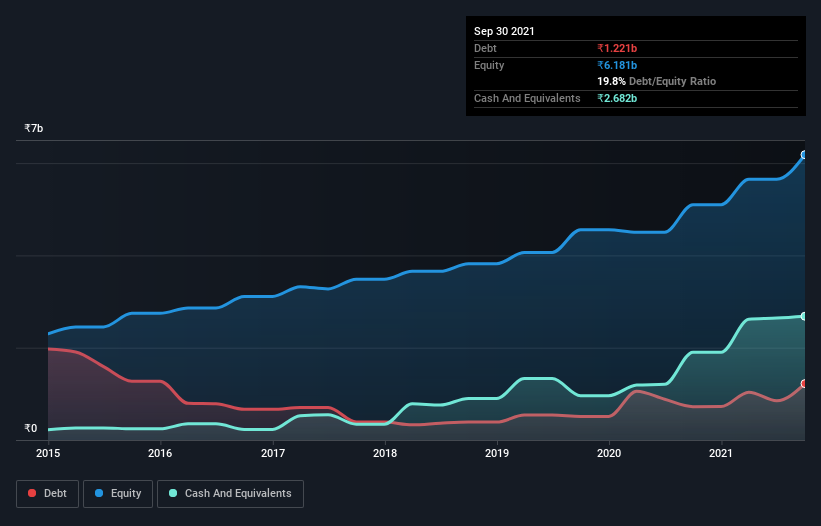- India
- /
- Basic Materials
- /
- NSEI:DECCANCE
We Think Deccan Cements (NSE:DECCANCE) Can Stay On Top Of Its Debt
Legendary fund manager Li Lu (who Charlie Munger backed) once said, 'The biggest investment risk is not the volatility of prices, but whether you will suffer a permanent loss of capital.' It's only natural to consider a company's balance sheet when you examine how risky it is, since debt is often involved when a business collapses. We note that Deccan Cements Limited (NSE:DECCANCE) does have debt on its balance sheet. But is this debt a concern to shareholders?
When Is Debt A Problem?
Generally speaking, debt only becomes a real problem when a company can't easily pay it off, either by raising capital or with its own cash flow. If things get really bad, the lenders can take control of the business. While that is not too common, we often do see indebted companies permanently diluting shareholders because lenders force them to raise capital at a distressed price. Of course, debt can be an important tool in businesses, particularly capital heavy businesses. When we examine debt levels, we first consider both cash and debt levels, together.
View our latest analysis for Deccan Cements
What Is Deccan Cements's Net Debt?
As you can see below, at the end of September 2021, Deccan Cements had ₹1.22b of debt, up from ₹722.3m a year ago. Click the image for more detail. However, it does have ₹2.68b in cash offsetting this, leading to net cash of ₹1.46b.

How Healthy Is Deccan Cements' Balance Sheet?
The latest balance sheet data shows that Deccan Cements had liabilities of ₹2.47b due within a year, and liabilities of ₹1.01b falling due after that. On the other hand, it had cash of ₹2.68b and ₹660.2m worth of receivables due within a year. So it has liabilities totalling ₹138.8m more than its cash and near-term receivables, combined.
This state of affairs indicates that Deccan Cements' balance sheet looks quite solid, as its total liabilities are just about equal to its liquid assets. So while it's hard to imagine that the ₹7.35b company is struggling for cash, we still think it's worth monitoring its balance sheet. Despite its noteworthy liabilities, Deccan Cements boasts net cash, so it's fair to say it does not have a heavy debt load!
On top of that, Deccan Cements grew its EBIT by 72% over the last twelve months, and that growth will make it easier to handle its debt. When analysing debt levels, the balance sheet is the obvious place to start. But you can't view debt in total isolation; since Deccan Cements will need earnings to service that debt. So when considering debt, it's definitely worth looking at the earnings trend. Click here for an interactive snapshot.
Finally, while the tax-man may adore accounting profits, lenders only accept cold hard cash. Deccan Cements may have net cash on the balance sheet, but it is still interesting to look at how well the business converts its earnings before interest and tax (EBIT) to free cash flow, because that will influence both its need for, and its capacity to manage debt. Over the last three years, Deccan Cements reported free cash flow worth 16% of its EBIT, which is really quite low. That limp level of cash conversion undermines its ability to manage and pay down debt.
Summing up
While it is always sensible to look at a company's total liabilities, it is very reassuring that Deccan Cements has ₹1.46b in net cash. And we liked the look of last year's 72% year-on-year EBIT growth. So is Deccan Cements's debt a risk? It doesn't seem so to us. There's no doubt that we learn most about debt from the balance sheet. But ultimately, every company can contain risks that exist outside of the balance sheet. These risks can be hard to spot. Every company has them, and we've spotted 4 warning signs for Deccan Cements (of which 1 is significant!) you should know about.
When all is said and done, sometimes its easier to focus on companies that don't even need debt. Readers can access a list of growth stocks with zero net debt 100% free, right now.
New: Manage All Your Stock Portfolios in One Place
We've created the ultimate portfolio companion for stock investors, and it's free.
• Connect an unlimited number of Portfolios and see your total in one currency
• Be alerted to new Warning Signs or Risks via email or mobile
• Track the Fair Value of your stocks
Have feedback on this article? Concerned about the content? Get in touch with us directly. Alternatively, email editorial-team (at) simplywallst.com.
This article by Simply Wall St is general in nature. We provide commentary based on historical data and analyst forecasts only using an unbiased methodology and our articles are not intended to be financial advice. It does not constitute a recommendation to buy or sell any stock, and does not take account of your objectives, or your financial situation. We aim to bring you long-term focused analysis driven by fundamental data. Note that our analysis may not factor in the latest price-sensitive company announcements or qualitative material. Simply Wall St has no position in any stocks mentioned.
About NSEI:DECCANCE
Proven track record with imperfect balance sheet.
Similar Companies
Market Insights
Community Narratives



